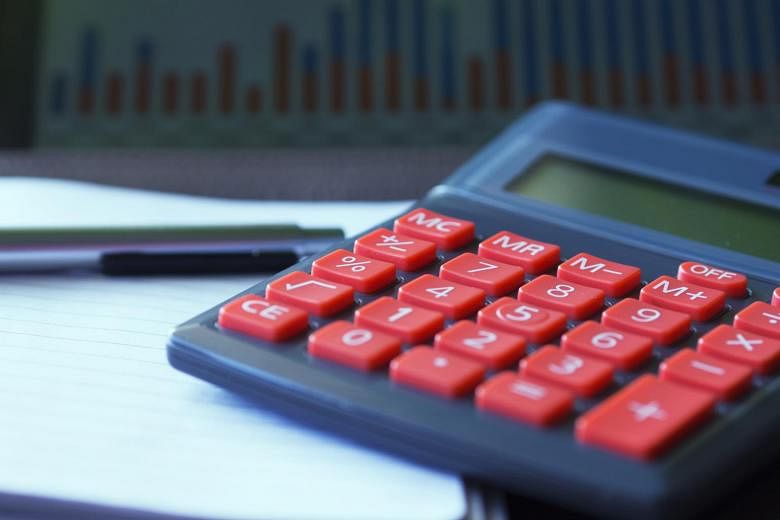Where does your money go each month? Now, especially, with financial goals and priorities in flux, it's important to know in granular detail.
We asked financial experts to weigh in on how to make the best of extra time at home to tune up your finances. If you don't even bother to open and look at your bank statement when it arrives each month, these tips are for you.
TAKE A FINANCIAL INVENTORY
Ms Stefanie O'Connell Rodriguez, author of The Broke And Beautiful Life, a book that's part memoir and part personal finance how-to, advises her clients to make a list of everything they own, including money in bank accounts, a retirement portfolio and investments.
The next step is to take an inventory of what you owe: credit card debt, car loans and student loans. Calculating your net worth means subtracting debts from assets.
"Doing that holistic inventory of your financial life helps you identify where the most pressing needs are and what you need to be focusing on," she said. A credit card with a large balance and a high interest rate might take priority. Or maybe it's time to create an emergency fund.
Mr Douglas Boneparth, president and founder of Bone Fide Wealth, a financial planning service, encourages people to look at last year's statements through the online archive of credit card and bank account statements. "It's very hard to make changes unless you actually know what you're spending money on," he said.
He categorises expenses into buckets: housing, daycare, entertainment and utilities, for example. Apps can help. Mint gives a visual snapshot of where your money goes, Pillar tracks expense data, and Personal Capital provides a bigger picture of net worth by tracking spending, investments and your retirement fund.
GIVE EVERY DOLLAR A JOB
Financial educator Berna Anat is a fan of compartmentalising and assigning each portion of your income to fulfil a certain role.
"You have to give every dollar a job, every bank account a job, every credit card a job," she said. Rather than sorting out a budget after money comes in, she recommends having separate accounts for bill money, fun money - "ordering out, anxiety Amazon purchases, things like that" - and for short-and long-term savings goals.
She has seven accounts. Six for cash - for investing each month, therapy, vacation, two joint accounts with her partner to pay household bills, and a "landing strip" where all the money comes in and is reassigned - and a savings account for emergencies.
Ms Kumiko Love, an accredited financial counsellor, recommends that people go back to cash. For each pay cheque, after paying bills online, she goes to the ATM and divides her money into seven envelopes, one for each area of spending in her life.
"The more that we can put our eyes on our budget, the better," she said. In using cash, "what you have left to spend is sitting right in front of your face".
CUT BACK ON SUBSCRIPTION SERVICES
Confined to home, our needs have changed. Netflix is essential; gym memberships, not so much.
Many things we used to pay for can be found for free or at a lower cost.
Apps like Charlie, Trim and TrueBill can help you identify and cancel subscriptions.
Ms Kiersten Saunders, the co-founder of rich & Regular, a personal finance blog, found that her fitness apps are now redundant.
"If I take a little more time and plan out a week's worth of workouts, I can find fitness leaders on Instagram to piece together a plan rather than paying for something highly curated," she said.
Ms Bobbi Rebell, host of the Financial Grownup and Money With Friends podcasts, realised that she has been reserving URLs for business ideas, but that most of them go unused.
"It all adds up," she said. "We all have quirky things that we don't realise that we're spending money on."
GET ON THE PHONE AND NEGOTIATE
No one loves a phone call with a lender, but calling just once can help you save. Ms Saunders recommends calling credit card companies, insurance providers and lenders. "You can defer a payment without having a negative impact on your credit report," she said, "but the creditor has to agree to that."
To frame the conversation, Ms Love recommends being direct: "Come out and say, Hey, this is my situation. I'm having a hard time making payments. Is there any way you can lower my interest rate?'" she said. "It just takes one phone call."
Some apps can help. For a few dollars a month, Cushion will scan your bank accounts, find fees, and negotiate them for you. You keep the refunds.
The most important thing to remember is that money management is a lifelong practice. "It's not something we do once and we're done," Ms Rodriguez said.
NYTIMES.

